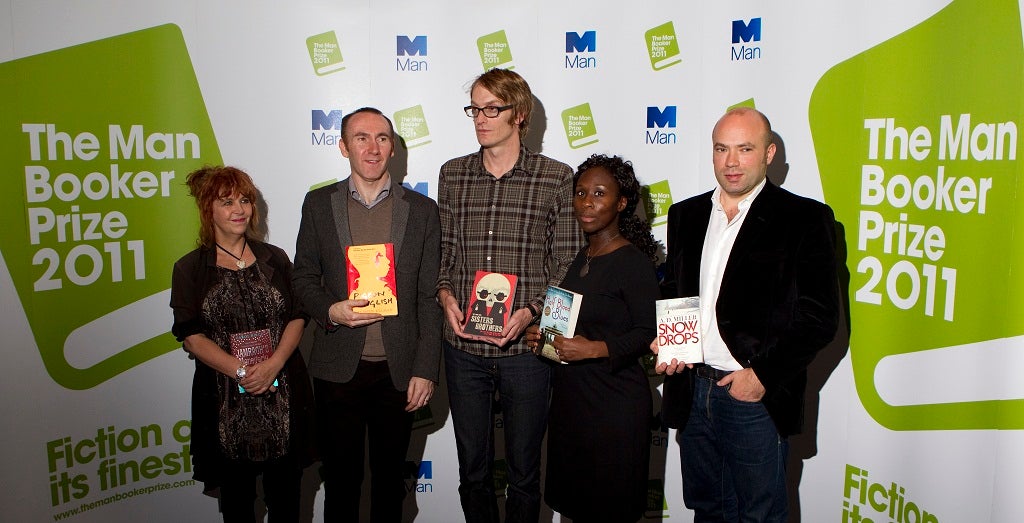Forget the Booker, the prize every author really wants is academic validation
There's so many prizes today's writers aren't bothered about who wins. The purpose awards serve now is to tell readers what to read.

When I was still working as a bookseller, back in 2009, I once helped at an event in St. James’ Church, in Piccadilly. Margaret Atwood was performing parts of her then new book, The Year of the Flood, with a choir and actors. After the performance she sat at a table signing copies, while listening to a large glorifying litany of compliments to her work. She thanked in a politely dismissive way.
Until a woman approached her for her book to be signed and told the writer that she was writing her PhD dissertation on one of her books and if she was able to meet later for a conversation, or for an email interview. Immediately the writer lit up and imparted her private mobile number and email address.
Up to 2009, Margaret Atwood had written 13 novels, 9 short story collections, among children’s books, poetry and non-fiction. She had been awarded prizes internationally, including L.A. Times Fiction Award, Arthur C. Clarke Award, Booker Prize, Prince of Asturias Award, Nelly Sachs Prize, among many others. What else could validate the reputation of an award-winning writer with worldwide recognition? Though this might not be clear to most readers, but more than any award, what every writer actually desires is academic validation, i.e., having one (or more) of their novels included in a university reading list and/or being object of dissertations and monographs.
But why are prizes so mistrusted these days? There are many possible answers, but two make, out of this many, more sense.
Prizes have become banal. There is a prize, an award, for almost every thing. And every writer that wants to sell enough books to make a living out of it, must, at least, have been laureled once or twice. The excess of awards makes them less valuable, thus also taking value from the awardee, person and book.
There is also a great distrust of awards’ judges. One of the best examples comes from Thomas Pynchon’s 1973 novel, Gravity’s Rainbow. As William Gaddis recorded, “when Gravity's Rainbow is being devoured by college youth everywhere and wins the National Book Award, its unanimous recommendation by the Pulitzer jury is overturned by the trustees.” Even if they are part of the industry, as publishers, writers, critics and even academics, often these people are not visible. And in no circumstance are their credentials questioned.
More recently, controversy rose over the Man Booker International Prize. Judge Carmen Callil resigned after the award was given to Philip Roth. Overruled by fellow judges, she did not think Philip Roth deserved the award. She explained herself, “I don't rate him as a writer at all. I made it clear that I wouldn't have put him on the longlist, so I was amazed when he stayed there.”
Still, awards play an immensely important part in today’s literary panorama. They tell people what to read. Books are no longer the preferred medium for the transmission of information and knowledge – being replaced by radio and TV, respectively, and, more recently, by the internet. Thus, literature graduations that were meant to teach people what to read and how to read have become obsolete. And that is where awards play their role. They might teach what, but not why.
In addition, creative writing courses seem to be contributing to this overall lack of literary sensibility. By slowly replacing literature graduations – that focus, essentially, on reading – creative writing courses are manufacturing more writers than readers, and therefore unbalancing the scale dangerously. This leads to the necessity of more awards to inform people of what to read. And publishers, of course, say thank you very much. By trying to perpetrate one artistic form, creative writing courses are slowly slaughtering it.
It seems natural, then, that some awards are more valuable than others. And this is by no means financially, though it often overlaps. Certainly the Guardian’s first book award is more relevant than David Higham Prize for the Best First Novel, just as the Booker is better than the Welsh Arts Council Fiction Award. And the Nobel trumps them all – Pulitzer and National Book Award included. Does this mean that the Nobel remains the last trustworthy award?
Maybe not the trustworthiest when it comes to literary awards, but definitely the most coveted literary laurel. In the words of Alfred Nobel, it awards “in the field of literature the most outstanding work in an ideal direction.” Maybe for this reason, the Nobel Prize for literature is the paragon. But even this has not been without controversy, as many authors such as Vladimir Nabokov, Italo Calvino and Jorge Luis Borges, despite their outstanding outputs, were never awarded, though widely recognised. And in more recent years the Prize has become more and more politicised, to the point where some believe that it will never be again awarded to an American writer.
In the wise words of William Gaddis, “write what they want and you'll end up with a Pulitzer Prize follow you right to the grave. Maybe won the George Cross even the Nobel but once you've been stigmatized with the ultimate seal of mediocrity your obit will read Pulitzer Prize Novelist Dies.”
Miguel Fernandes Ceia is a writer, editor and translator. He is speaking at Bored of the Booker: prizes, prizes everywhere at the Battle of Ideas festival on Saturday 20 October
Independent Voices is partnering with the Battle of Ideas festival to present a series of guest articles from festival speakers on the key questions of our time.
Join our commenting forum
Join thought-provoking conversations, follow other Independent readers and see their replies
Comments
Bookmark popover
Removed from bookmarks